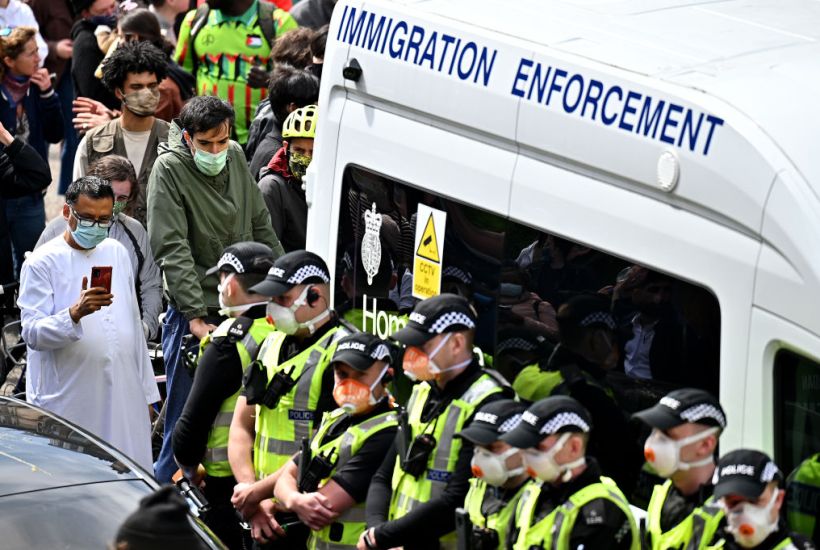The rule of law is very simple: it means ‘everyone must obey the law’. Last year, much hay was made by a variety of politicians claiming the government might breach the rule of law over Brexit. It had not. But even the idea that the rule of law might have been broken was given rightful attention. We should take from that a comforting truth that breaches of the rule of law matter to society.
This week, a large group of people physically obstructed immigration officers in the proper conduct of their office in Glasgow, preventing them from detaining two men. This was a breach of the rule of law.
The whole point of the rule of law is that a billionaire in a diamond hat still has to have points on his licence if he speeds. Rich people don’t get special treatment. No one gets special treatment. And no one can avoid the law just because their supporters obstruct the police in carrying out their duties.
Whatever you feel about these breaches of the rule of law is politics. If you support them then you will be feeling like the undergraduate who is first told: ‘No, actually Robin Hood is probably guilty’. But these breaches have very clearly occurred. And the EU has seen them.
The EU is a legal construct. It was made by treaties, and is now one treaty – the Treaty on European Union (TEU). This treaty states in its preamble that every member state confirms their ‘attachment to the principle[s] of… the rule of law’. That is repeated in article two and given real teeth in article 21. The rule of law matters inside the EU, just as it matters here. You cannot breach it and imagine everything will be quietly forgotten.
The new Brexit agreement also commits the EU and UK to upholding the rule of law. It’s repeated in the preamble. In Article 137, it goes much further. If the EU thinks the UK has ‘serious and systemic deficiencies’ in upholding the rule of law, then the EU can suspend part of the treaty. The UK can do exactly the same (and it is fair to highlight that parts of the EU may also be breaching the rule of law).
When I read the treaty, I thought this article was a bit odd, because the EU and UK are both generally law abiding countries. Clearly it would hurt the whole of the UK if this article is breached.
The breach of the rule of law which occurred in Scotland is not yet, I think, systemic in the terms article 137 means. It is clearly serious though. The rule of law isn’t a game. It is a fundamental principle. And if it goes, we may as well all go home, hug our loved ones and await the end.
The events in Scotland breach the rule of law, but they probably don’t (thanks to the careful wording of the agreement) put the UK in breach of our agreement with the EU. Yet. But those political actions in Scotland (not, it is important to note, the people of Scotland) have breached a fundamental principle of the EU.
As a matter of law, were Scotland therefore to make an application to join the EU as an independent nation, it would not be allowed to join if the EU were following its own laws. The EU would make demands for change – similar to those it is demanding in current Member States.
Leaving aside the political implications of the Glasgow incident, breaching the rule of law has very serious legal consequences. Our UK treaty depends on us all obeying the rule of law. If your political aim is to join the EU, then you need to be spotless in obeying the rule of law and it seems wholly right that that is explained.
Got something to add? Join the discussion and comment below.
Get 10 issues for just $10
Subscribe to The Spectator Australia today for the next 10 magazine issues, plus full online access, for just $10.




















Comments
Don't miss out
Join the conversation with other Spectator Australia readers. Subscribe to leave a comment.
SUBSCRIBEAlready a subscriber? Log in